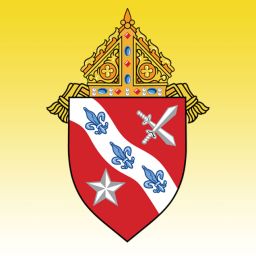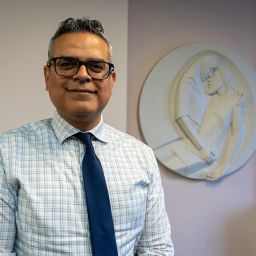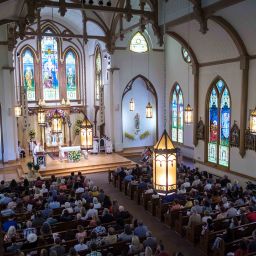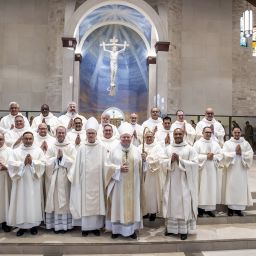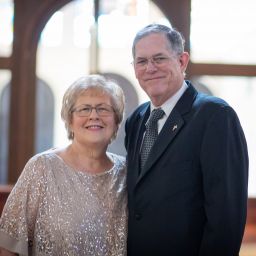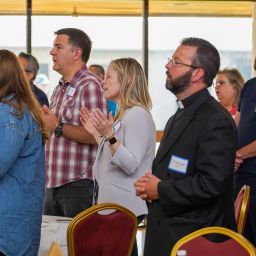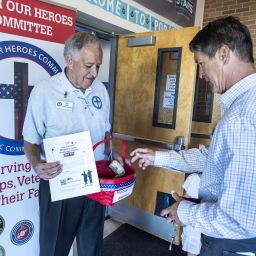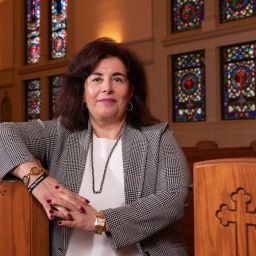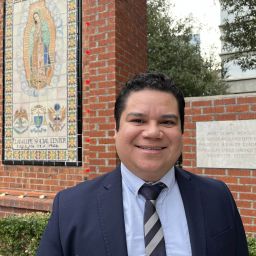By Amy White
The Texas Catholic
“More than 90 percent of deaf people in the country don’t go to church,” Julia Marincel stated.
The Diocese of Dallas American Sign Language interpreter was speaking in reference to surveys that have shown this sobering trend among members of the deaf population in the United States, including baptized Catholics, who do not attend church due to a deficit in accessible ASL religious services. Speaking to the National Catholic Register, Father Mike Depcik, a chaplain for the Deaf ministry in the Archdiocese of Baltimore, estimated the percentage to be as high as 96%.
Among the religious groups seeking to address this stark statistic is the Diocese of Dallas, which has been working for years to make Mass and faith formation classes more accessible to deaf members of the local faith community.
“When we are missing anyone from the pews and from Church life, we’re missing a piece of ourselves,” Melissa Waldon, director of the office for Persons with Disabilities in the Diocese of Dallas, said. “Church is for everyone, and so we want to make sure that we are providing proper accommodations and accessibility to really make it Church for everyone.”
Interpreted Masses
One way the Diocese of Dallas has made the faith more accessible to members of the Deaf community is by facilitating ASL interpreted Masses. Four parishes in the Diocese of Dallas currently offer weekly interpreted Masses: Prince of Peace Catholic Church, St. Bernard of Clairvaux Catholic Church, St. Monica Catholic Church, and St. Thomas Aquinas Catholic Church. The ASL interpreted Masses at St. Thomas Aquinas are livestreamed, so deaf members of the local Church can have access to the Mass even if they are unable to travel to the Mass, Waldon said, noting that many deaf people may have difficulty attending Masses in person due to discomfort with driving.
Currently, the diocese has three ASL interpreters to sign during Masses on Sundays and on special occasions like funerals and weddings, Waldon said. Marincel, a professional interpreter living in Flower Mound, is one of them.
Marincel began signing for the diocese a decade ago. The impetus, she explained, was a desire to make the Catholic faith more available to members of the Deaf community. She had been told many stories from deaf friends about how they had left the Catholic Church due to a lack of access to ASL interpreted Masses or a lack of understanding of what the Catholic faith taught.
“That was where I realized that God could use this skill that I had, this language skill, for something more,” she recalled. “I felt a nudge to call the diocese and see if they needed anyone to help.”
Since then, Marincel has signed for Masses and sacramental preparation classes in both English and Spanish.
“Initially, there was a lot of prep work,” Marincel said, recalling her early days of signing for Masses. She remembered spending hours in preparation, studying the Mass material to determine how to interpret the concepts.
“For the homily, you don’t know what you’re getting, which is kind of fun,” she said, “and then for the readings, it’s a lot of really complex scripture that been passed down over thousands and thousands of years with a very rich context; and they usually read it fairly quickly. So, you have to figure out the best way to convey this concept in a limited time.”
Marincel shared that the ASL signs for “Trinity” and “consubstantial” have already been established by the Deaf community, but others, like “chastity” or “transubstantiation,” require some creativity on the part of the interpreter — sometimes by expanding upon the concept and other times by spelling it out or using an equivalent word.
Through her work as an interpreter for the diocese, Marincel has grown to deeply love the members of the Deaf community she encounters. She said she is inspired by “seeing the courage and the determination of the deaf Catholics who are wanting to learn more about the faith and to receive the sacraments.”
The interpreter also mentioned that the community has shown some signs of growth recently, including the participation of two deaf Catholics who joined the Church through Order of Christian Initiation of Adults in the diocese this year.
“The work and the prayer that we’ve put into it, or that the diocese has put into it, is finally starting to bear fruit,” Marincel said, before adding that more prayer, effort, and generosity is needed from the wider Church to support deaf Catholics who are making the decision to attend church despite the obstacles.
Faith formation
As the diocese offered interpreted Masses, leaders in deaf ministry became aware of an additional need of the local Deaf community: faith formation. At times, interpreters sign difficult concepts within the liturgy. Deaf Catholics — some of whom had gone their whole lives without access to prior catechesis — may feel lost without some instruction to understand the concepts they see in the Mass. Faith Inspired Signing Hands helps bridge that gap.
FISH classes are faith formation classes for deaf Catholics held once a month during the school year at All Saints Catholic Church. On class days, participants attend the 11 a.m. Mass before going to the parish pancake breakfast with the wider church community and then to their FISH class.
Mark Lorms, an All Saints parishioner, is the class instructor; and Stacey Aucoin, another All Saints parishioner and a longtime contributor to the diocese’s deaf ministry, is the coordinator of the FISH program. Aucoin explained that during the hourlong classes, FISH participants go line by line through the readings for the following week to understand what is being said.
“I’ll take a term that I’m pretty certain they have not seen before, and we’ll expand on that,” she said. “By the end of the class, we’ve gone through the readings a couple of times, so that when they go to Mass the following week, everything that’s being said and that they are receiving interpretation for they understand.”
Aucoin shared that these classes have attracted a diverse set of students: profoundly hard of hearing people, hearing students learning to become interpreters, people who are both partially blind and partially deaf, and both “little ‘d’ and big ‘D’” deaf members of the diocese.
“If you capitalize the ‘D,’ that means they’re culturally Deaf as well, and not just auditorily,” Aucoin explained.
She noted with admiration the commitment of FISH participants who attend classes despite the obstacles to travel that they experience, with one of the deaf-blind members even asking, “Are you sure we can’t do this every week?”
“It’s giving them full access,” Aucoin said. “We’re basically empowering them to have that deeper conversation about their faith; and ultimately, that’s what this is about.”
The diocese is committed to continuing to engage with deaf members of the local Church, Waldon shared, and she encouraged hearing Catholics in the diocese to join that effort.
“We have many hearing people who are involved,” she explained. “Anybody who has a heart for this ministry and wants to be involved will not be turned away.”
To learn more about volunteering for deaf ministry in the diocese, contact Melissa Waldon at [email protected].
Cutline for featured image: Julia Marincel has served as an American Sign Language interpreter for the Diocese of Dallas for the past decade, interpreting both Spanish and English Masses and sacramental preparation classes into ASL. Marincel is pictured interpreting a Mass at St. Bernard of Clairvaux Catholic Church. (Courtesy photo)



